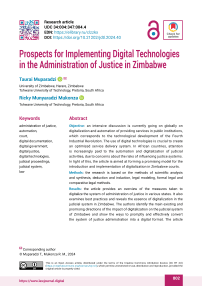Prospects for Implementing Digital Technologies in the Administration of Justice in Zimbabwe
Автор: Muparadzi T., Mukonza R. M.
Журнал: Journal of Digital Technologies and Law @lawjournal-digital
Статья в выпуске: 2 (4), 2024 года.
Бесплатный доступ
Objective: an intensive discussion is currently going on globally on digitalization and automation of providing services in public institutions, which corresponds to the technological development of the Fourth Industrial Revolution. The use of digital technologies is crucial to create an optimized service delivery system. In African countries, attention is increasingly paid to the automation and digitalization of judicial activities, due to concerns about the risks of influencing justice systems. In light of this, the article is aimed at forming a promising model for the introduction and implementation of digitalization in Zimbabwe courts. Methods: the research is based on the methods of scientific analysis and synthesis, deduction and induction, legal modeling, formal legal and comparative legal methods. Results: the article provides an overview of the measures taken to digitalize the system of administration of justice in various states. It also examines best practices and reveals the essence of digitalization in the judicial system in Zimbabwe. The authors identify the main existing and promising directions of the impact of digitalization on the judicial system of Zimbabwe and show the ways to promptly and effectively convert the system of justice administration into a digital format. The article identifies the advantages of digital data processing in judicial bodies and obstacles to the use of digital systems in the administration of justice. The latter result in the insufficient optimality of the Integrated Electronic Case Management System (IECMS). Scientific novelty: the study builds an optimal model for the introduction of digital technologies into the judicial system in Zimbabwe, aimed at improving the efficiency of courts digitalization and transforming the justice administration system. The authors proved that the crucial factors of achieving this goal are the auxiliary infrastructure of information and communication technologies, the level of education and awareness of citizens, and the ongoing state and legal policy. Practical significance: it is expected that the proposed model to implement digitalization in Zimbabwe courts and improve its efficiency will allow for the comprehensive and uninterrupted implementation of IECMS.
Administration of justice, automation, court, digital documentation, digital government, digital justice, digital technologies, judicial proceedings, judicial system, law
Короткий адрес: https://sciup.org/14131253
IDR: 14131253 | УДК: 34:004:347:004.4 | DOI: 10.21202/jdtl.2024.40


